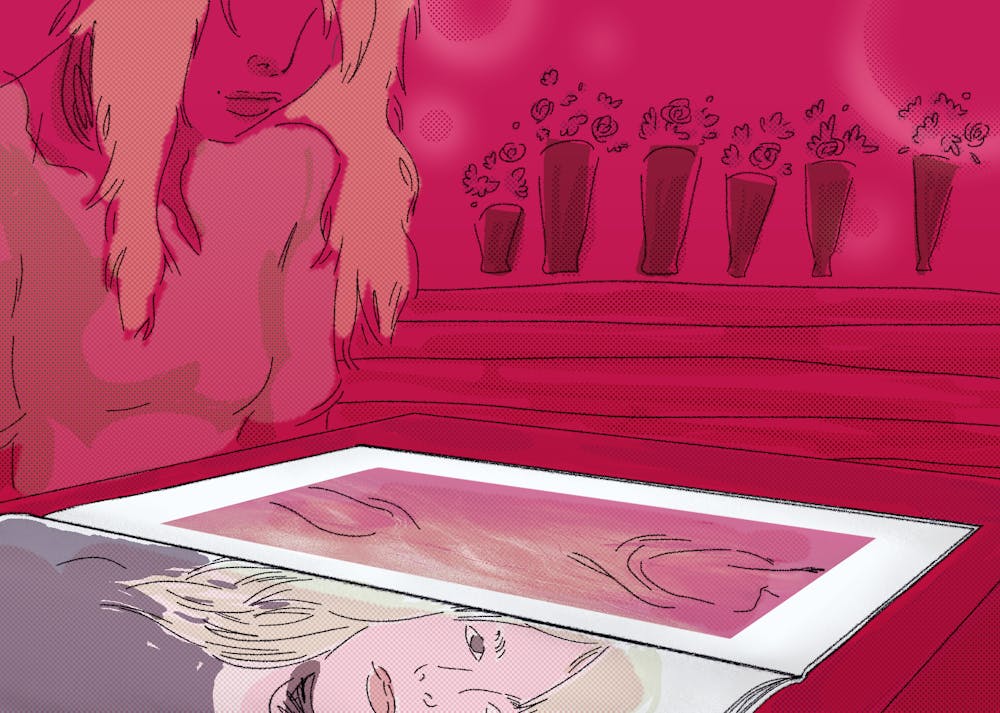On her newest record, “FLOWERS for VASES / descansos,” Hayley Williams took her feelings from past relationships, bottled them and put them on a shelf to collect dust.
She simultaneously sweeps that same dust off a distant nostalgia, reminiscing on the early days of Paramore, the iconic band she has been the frontwoman of for 17 years.
Williams wrote “FLOWERS for VASES” as a prequel to her 2020 debut solo project “Petals For Armor.” There are clear lyrical parallels between the two records, but her 2021 sound is a more stripped back continuation of the melancholy expressed on the prior.
With Paramore, Williams helped pioneer the 21st century archetype of being vulnerable, yet independent lead. Now, she is experimenting with that archetype’s instrumental evolution.
Sonically, Williams’ new record builds upon the growing mainstream popularity of the folk-influenced balladic singer, exemplified by Phoebe Bridgers and Taylor Swift, both of whom were nominated for Grammy awards for their respective 2020 releases, "Punisher" and “folklore.” Like Bridgers’ and Swift’s acclaimed 2020 records, “FLOWERS for VASES” is layered with minimalist guitar strums and sovereign piano pulses.
REVIEW: 'folklore' is what Taylor Swift was meant to do
Her first track, “First Thing To Go,” sets the tone for an album that explicitly addresses both toxic relationships and romantic nostalgia. Williams recognizes that a relationship cannot be seen in hindsight through rose-colored glasses.
“Why do memories glow the way real moments don’t? My altar is full of our love’s delusions," she sings.
The album’s alternate title is “descansos,” which are roadside memorials for those who have passed on. The descansos analogy is pronounced; Hayley Williams is putting her past relationships to rest and allowing them to become nothing more than drive-by memories.
Williams creates existential imagery with the second and third tracks, “My Limb” and “Asystole.” The latter is named for the medical term for flatlining, while the former aligns ending a toxic relationship with the amputation of an extremity.
She experiences a wakeup call on “Trigger,” the album’s fourth song. Williams croons on the chorus, “I got the trigger, but you hold the gun.”
She acknowledges the permanence of toxicity on the final chorus, changing the word “hold” to “own.”
On the album’s second half, Williams, who appeared with Paramore on Vans Warped Tour when she was just 18, looks back on the early days of her music career. She abhors her abnormal adolescence and longs for a sense of normalcy.
On “Inordinary,” Williams sings, “We left home when we were teens / I grew bored of simple things,” before concluding on the track’s final hook that there is “beauty in the ordinary.”
After “Inordinary,” there’s a return to romanticism as Williams ponders what her former lover is up to since their split on “HYD.”
One track later, she is accepting her idealization of the relationship on “No Use I Just Do.”
Williams expressed on Twitter that “Find Me Here” — a track seemingly about being available in a relationship with someone struggling with their own mental health — is her favorite song on the album, specifically the second verse: "As long as you keep wanting me around / But this is one trip you're gonna have to take alone / When you come back you'll find me here / Where I belong."
The song originally appeared on her “Petals for Armor: Self Serenades” EP and she added a new verse to the “FLOWERS for VASES” version.
Surprisingly, as an artist known for her vocal talents, Williams delivers an instrumental as the 13th song, “descansos.”
The honorary title track provides an interlude before her return to reminiscence on “Just A Lover,” the outro riddled with nods to Williams’ life before fame.
“Once upon a time when we were school kids / Mix CDs and carpool kids / No little cameras to witness,” she sings.
While those days have passed, Williams has not lost her touch with the pen over the years. This record showcases some of her most eloquently emotional work yet.
Overall, Williams’ second venture into creating a solo record comes across as even more authentic than the first.
On an album where she performed every instrument herself, Williams demonstrates a musical versatility that casual Paramore fans weren’t aware was in her arsenal. The subtle instrumentals give Williams’ supremely talented vocals room to flourish and allow her anecdotal lyricism to stand in the forefront.
Her verses are refreshingly genuine and a sign that stars of decades passed still have a place in the music of the present.
With “FLOWERS for VASES / descansos,” Hayley Williams further cemented her place in music history as a symbol of simultaneous personal autonomy and poignance.
Reach the reporter at ghanevol@asu.edu and follow @GannonHanevold on Twitter.
Like The State Press on Facebook and follow @statepress on Twitter.
Continue supporting student journalism and donate to The State Press today.




